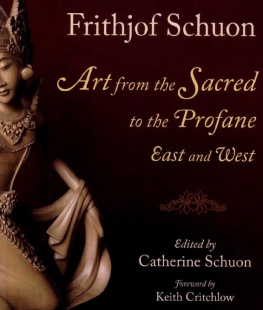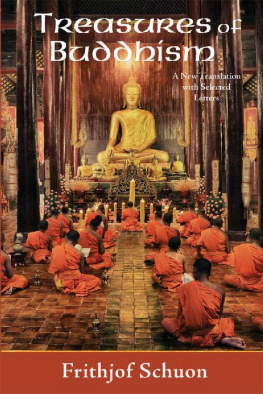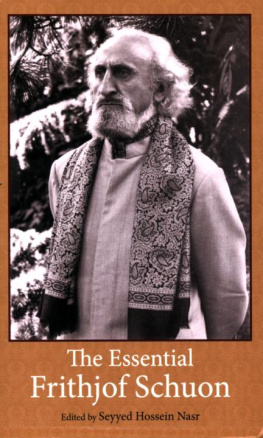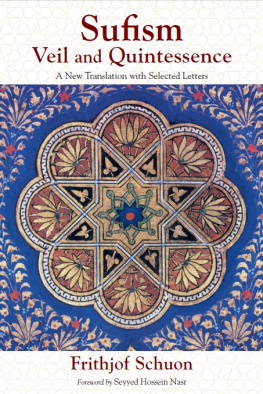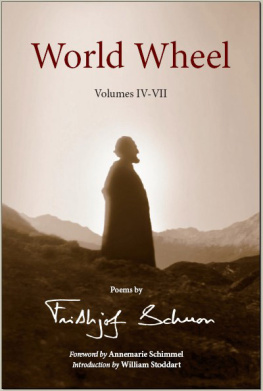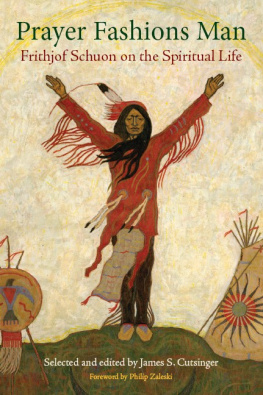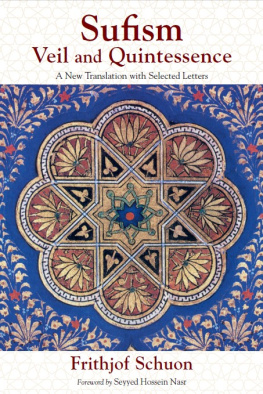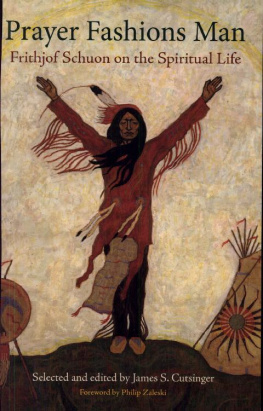APPENDIX
Selections from Letters and Other Previously Unpublished Writings
The enigma of the Basmalah is this apparent tautology: the adjunction, after the Name the Clement or the Infinitely Good, of the Name the Merciful; is not Mercy contained in Clemency, and would it not be more logicalif one may say soto add to the Quality of Clemency a Quality of Rigor?
However, this has absolutely nothing to do with the juxtaposition of qualities, but with a doctrine of the Principle in itself, which is the following:
When, in the Basmalah , we have pronounced the Name Allh , we have enunciated the one, absolute, and infinite Reality; now it is important to specify its intrinsic nature, which is Rahmah : that is to say Goodness, Beauty, Love, Beatitude. Rahmah is not therefore one Quality amongst others, it is the inward radiation of the Dht , of the very Essence. That is why the Koran says: Call Him (God) Allh or call (Him) Rahmn.... And that is also why it is written on the Throne of Allh : In truth, My Clemency ( Rahmah = Goodness/Beauty) hath preceded My Wrath. And likewise the Koran: Thy Lord hath prescribed for Himself Clemency.
After having enunciated the nature of the Essence ( Dht ), the Basmalah intends to mention as well the differentiated degree, that of the Qualities ( Sift ) or of Being, and it does so by the Name the Merciful ( Rahm ), in order to indicate clearly that Mercy is the firstor the most fundamentalof the Qualities of Being; that it is in consequence more real, in a way, than the Qualities of Rigor. For: My Mercy embraceth all things, according to the Koran; Mercy is not only in the Principle, but also in the existential Substance of beings.
Hence, the Basmalah teaches us three things: firstly, the Absolute; secondly that the Absolute is, not an unintelligible and somehow anti-human Power, as the omnipotentialist theologiansout of pious ineptitudewould have it, but essentially Goodness, Beauty, Love, Beatitude; thirdly, that the first Qualityat the non-supreme degree of Beingis, therefore, Mercy; for Allh is essentially Communication of His own Good on the one hand and, on the other, Attraction towards Himself. Man is made in the image of God and his qualities consequently reflectand render intelligiblethe Divine Qualities, the only ones that are.
The most immediate meaning of the Islamic Benediction of the Prophet is the homage owed the Logos . The necessity of this homage results from the necessity of the worship of God; for the Logos is the immediate reflection of God, and there is no possible access to God except through the Logos ; there is no perfect worship without this homage. It could even be said that the Logos is neither created nor uncreated; the Logos coincides in fact with the Spirit ( arRh ), which certain metaphysical perspectives encompass in the Divinity and thereby in the worship owed God; some even extend this worship to the earthly representative of the Logos , that is to say that the Hindus do not hesitate to worship the Guru inasmuch as he is a vehicle or personification of the Logos .
If in Islam homage to the Logos takes the form of a prayer of benediction, it is because of the particular perspective of Islam, which requires that this homage pass through God; one also wants to offer to the Logos what is most preciousfor it is necessary to love the Logos in virtue of the love of Godand the most precious thing is the divine benediction, the Rahmah .
Metaphysically, it could be said that it is impossible to reach God-Being ( shvara ) without passing through God- Logos ( Buddhi ), as it is impossible to reach God-Essence or Beyond-Being ( Paramtm ) without passing through God-Being ( shvara ). Putting aside for now the distinction between Being and Beyond-Being, and having in view only the Principle as such with respect to Manifestation, we shall say that the formula l ilha ill Llh concerns the Divine Principle, whereas the formula Muhammadun Raslu Llh concerns the divine Manifestation; likewise for these two other formulas: Allhu akbar and wa ladhikru Llhi akbar .
To love God is to be loved by God; now in order to be loved by God it is necessary to love the Logos ; and to love the Logos is to follow it, that is to say to enter into its moldthe Sunnah the quintessence of which is the Remembrance of God; and it is for this reason that one of the names of the Prophet is Dhikru Llh . The Prophet personifies both Dhikr and Faqr , as is indicated by the qualities Rasl and Abd , and as is expressed by the designation anNab alUmm . The Logos comprises secondary manifestations, and these are firstly the Family ( lihi ) and the Companions ( sahbihi ).
In the Logos there is a descending Dhikr and an ascending Dhikr : the first, which corresponds to the Laylat alQadr , is Revelation; the second, which corresponds to the Laylat alMirj is the Invocation.
If the sun were God, who would not render homage to the moon which illuminates the night with light lent by the sun? And if the moon were God, who would not render homage to the reflection of the moon in a pond? It is thus that homage to the Logos imposes itself as a result of our worship of God.
The meaning of the blessing on the Prophet ( salt al nnab ) is actually this: Lead me back to the primordial state; this means; to the Fitrah , the primordial intention of the human state, the primordial perfection; to the perfection of the hanf , of him who has remained faithful to the primordial state and has preserved the intuition of the nature of things. The name of this perfection in Islam is Muhammad , and its two complementary extensions are Salt and Salm , blessing and peace; the lotus and the jewel.
All greetings addressed to the Logos be it manifested in masculine or feminine formhave essentially the same meaning.
The Prophet said: The key to Paradise is prayer, and the key to prayer is the ablution.
The term ablution has both a literal meaning and a symbolic one. In the first sense, the ablution refers to the canonical prayer; in the second sense, it signifies a disposition of the soul and refers to all prayer. The first meaning is particular and the second universal.
It is this universal meaning that Christ expressed when he said: But thou, when thou prayest, enter into thy closet, and when thou hast shut thy door, pray to thy Father in secret. In other words, the ablution, in the universal sense which is its essence and its reason for being, is to separate oneself from the world in virtue of the consciousness of God; indeed, prayer is valid only on condition that we know Whom we are addressing.
To be qualified for prayer, man must realize in his heart that there is no divinity except the sole Divinity ( l ilha ill Llh ). And likewise: The Supreme Principle is Reality, the world is merely appearance ( Brahma satyam , jagan mithy ). And there is no lustral water like unto Knowledge.
Tradition teaches us that the gestures of the canonical prayerwhether they are Hanafite, Shafite, Malikite, or Hanbalitego back to gestures of the Prophet who prayed in different ways; but tradition does not teach us why these gestures differ from one another, nor what their respective symbolism is. In order to know itinsofar as our need for logical understanding requires thiswe cannot appeal to anything other than to the objective symbolism of the forms and to the subjective experiences of the acts. Western Africa, if I am not mistaken, is Malikite; consequently, the arms are left hanging alongside the body during the Ftihah ; this is the natural and primordial position of the man who stands before Allh , without thinking of anything other than his own existence or his ontological innocence. Other gesturesin other ritual schoolssymbolize diverse modes of concentration, or rather, they symbolize concentration in diverse ways or according to diverse aspects. There is no need to ask oneself what manner must be chosen; it is the madhhab that has made this choice for us. One must not mix the practices of the four ritual schools, as some do; the norm is to follow the madhhab of the country in which one lives; or of our country of origin.


